As most of you can imagine, winter is the farmer’s downtime. We’ve put the farm to bed for the season and now actually have some leisure time to spend catching up on sleep, chores, planning next year’s crops, buying new toys (read: machinery & tools), and my personal favorite, reading. In the summertime I was always far too tired by the end of the day to read before falling asleep. Truthfully I was, more often than not, asleep before my head hit the pillow. Then I came back to school at Montana State University in Bozeman, so I was reading and doing other things that were my “normal” before summertime and being a farmer.
Over winter break, I finally had a chance to read for my own pleasure (as opposed to the heavy reading loads assigned by my professors). For Christmas, my sister gave me a book called The Dirty Life: A Memoir of Farming, Food, and Love by Kristin Kimball. The book is a memoir of her first year of farming with her husband, Mark. It intrigued me on a few different levels. The first being, Kristin was a woman living in New York City with a rent-controlled apartment, healthy social life, and a decent writing job until she met her (eventual) husband. Mark was already a farmer in Pennsylvania at the time, and she traveled to his farm to interview him for an article she was pitching. In short, she was a comfortably civilized woman who dropped it all on a whim to pursue a relationship with a crazy farmer a few months after first meeting him. They built a farm from the bottom up together. For those of you who know me already, you might see the parallels I might’ve initially drawn between their story and my own. For those who don’t– last June, I decided to leave my house and job (and otherwise conventional existence) in Bozeman on a whim to join Max. We had begun dating in April, and by late May we were living in a tipi and working together — farming together. While reading the synopsis on the back of the book I was thinking, “Oh my god, I’m not the only one!”
Everyone, everywhere, everyday makes decisions. Most decisions are small, generally those that aren’t going to change your life forever… such as the choice to guzzle coffee or chai tea in the morning, or determining the best route to work. Some are bigger decisions, but still are the easy ones to make because you have success stories to draw strength from. Others have walked these paths before you and their lessons surround you at every turn. Think about your decision to go to college or to buy a house or car; these are decisions that have been made by so many people, and, on the whole, don’t end up in absolute chaos. When chaos does erupt, you usually have someone’s story to refer to for guidance. And because these roads have been already forged for you, and you have a general idea of how it’ll all work out, you go ahead with confidence.
But what about those decisions for which you don’t have a roadmap? The ones that are so foreign, so far beyond your comfort zone that you choose to move forward without fear?
These decisions don’t come about all that often. But they surely are out there for each of us. I can say without a doubt, my decision to join Max and the Missoula Grain and Vegetable Co. was absolutely one of those uncharted, crazy decisions.
So as I started reading this beautifully crafted novel I had some — unspecific — expectations of being able to draw parallels and relate to Kristin and her story on some levels. There are some obvious differences between our two stories such as our relative ages. She was well into adulthood when she met her farmer, while I am still in college (graduating this coming December!). There’s also the issue of Max and Mark. Mark was already running a pretty successful farm operation in Pennsylvania before they decided to go to Essex, New York, so he had a few more years of experience running his own operation than Max, who was fresh out of college in May 2013. This year of farming was a huge learning experience for the both of us; my first ever and Max’s first as an independent farmer.
For both Max and I, there was a distinct feeling of flying by the seat of our pants this season. And often, we’d both kick ourselves for making “rookie mistakes.” However, after reading The Dirty Life I realized something very important: farming is a constant game of trial & error and even the most experienced farmers will undergo certain setbacks and unexpected (often comical, in hindsight) circumstances. And truly, I was able to find far more similarities in their story to ours than I was expecting.
After getting back from visiting my parents in Seattle for the holidays, we started talking about planning next year’s crops and leafing through the seed catalogs. While we were looking through the tomato section and ogling the bright varieties, I made a very tasteful joke about how these catalogs were like the farmers’ PlayBoy. Later that same afternoon I got to the part in Kimball’s memoir where they, too, were planning their next season’s crops:
“Mark and I had spent evenings poring over the seed catalogs that had arrived during the darkest week of winter, piling up next to the bed like farmer porn.” (p. 119)
After this point in the book, the similarities just kept coming at me. From the part where they were harvesting a common, but tasty weed (lamb’s-quarter) to offer farmshare members in the very early season before the vegetables really started coming on, to the part when they discovered hornworms in their tomato patch.
“The spokesthing for the hot decline of the season was the tomato hornworm… Either way I had to admire the camouflage, which was so good I could stare at a damaged plant for ages before I saw the worm, though the evidence of its presence was obvious: leaves missing, whole stems consumed, big, wet clumps of black frass.” (p. 212)
I still remember how excited I was when I had successfully figured out what was causing these little turdlets to appear in our lettuce patch. The boys believed them to be insect eggs of some kind. But I wasn’t convinced so I researched the black beads in our lettuce patch and found out exactly what they were, how potentially damaging they’d be in the future, how to biologically control them, and then located the worms themselves to be doubly sure that I had correctly identified our little hornwormy friend. It wasn’t until that point that I really started feeling like a real farmer, like I was contributing to something much larger than myself and like I was actually kind of good at it.
A few of you might remember that Max started all of the pre-season sprouting of the majority of our crops in his old apartment, in Bozeman, which he then had to transport to Missoula. The basic planning that went into the move was enough to make your head spin. He had to time it perfectly, between spring finals and making sure his departure coincided with a reasonably warm (read: above freezing) early spring evening. To top it all off, figuring out how to tetris-in over a thousand young plants to a not-so-big truck was a feat in itself. Imagine three levels of plywood shelves stacked precariously atop each other with barley enough headspace between each shelf for the trays and seedlings. Eventually we had to do it all again to move the plants from the house in Missoula out to the farm, which was significantly easier with multiple vehicles at our disposal for the job.
In the jumble to get everything safely transported and to their final home at the farm, the labels which told us the varieties of a given vegetable-type we were planting fell off of the majority of our tomato and squash plants. As a result we transplanted them, not knowing exactly what was growing where. So I was surprised, and entertained when I read:
“In the trip between her farm and ours, the plants had lost their identification tags, so when we planted them in the field, many varieties were all mixed together– slicing tomatoes intermingled with cherry tomatoes, and hollow tomatoes meant for stuffing growing next to a bright yellow variety that looks cheekily similar to a peach. We’d never again have such a wildly beautiful tomato patch, and it produced extraordinarily well, as though even the plants themselves were inclined to help us when they could.” (p. 169)
Our own tomato patch was just as disorganized and beautiful, as was our squash patch. I took to calling each of our squash plants “Surprise Squarsh”, until they actually began producing and we could actually tell what had been planted where, and even then some of the varieties were hard to distinguish.
Most importantly, this book caused me to reflect on the last year and think hard on exactly what I liked, disliked, loved, hated, could and couldn’t deal with. Farming is definitely not for everyone. It is all-consuming and demanding in nature. Last summer was by far the most taxing, beautiful, rewarding experience of my life to date, and regardless of what the future holds for me, I will always have that.
I loved the beautiful chaos that happened every day in the field; starting the day with a plan, being lucky if that plan was adhered to, and having to deal with little (or massive) bumps in the road that materialized, one after another and seemingly from nowhere.
Farming for 10+ hours a day, 7 days a week, is not an easy feat. Nor is it something that I would recommend for everyone. There’s this necessity of every farmer to be in the moment and be able to let go of the expectations with which you walked into the field. But, when it comes to the end of the day, and you have a table full of fresh, whole, foods to refuel and nourish yourself with, it suddenly all becomes worth it. Max likes to quote Severine of the Greenhorns Radio show when she says, “We work like dogs so we can eat like kings.” This same idea (unsurprisingly) popped up in the book as well..
“There were weeks that spring when Mark and I would end our days so late and so exhausted we’d drive to town for a bag of chips and a pizza, one with a flabby crust and insipid sauce. I could live with dirty clothes, I was avoiding the wedding plans anyway, and, to be honest, I’d never been much of a duster of furniture, but if I wasn’t going to get to eat our food, there was no point in going on. We had a come-to-Jesus meeting and agreed on that point, and from then on, we made it a priority to cook at least one good meal a day for ourselves…” (p. 155)
The relationship between farmers and food is a very intimate one. For many farmers, the point of it all is to be able to feed people and feed them well.
I can now admit, we were guilty of ordering cheap pizzas a few times this summer. Especially after harvest/CSA pick up days when we would spend the night in town and be too exhausted to cook for ourselves. Until we, too, had a moment of clarity where we decided we deserved to eat the beautiful food we were growing and spending money on inferior products was absolutely pointless.
While I was reading the book, I would read passages to Max that struck a cord in me or that were just too eerily similar to something that happened to us, or simply parts Kristin wrote about her husband that reminded me of Max. Most notably, they share this vision of providing a full-spectrum CSA program, which provides a whole diet to its members:
“He wanted to build a farm that was so diversified it could supplant the supermarket, the kind of farm our great-grandparents’ generation grew up on, but built big enough to feed a community instead of just a family. We would produce everything our members needed, beginning with the edible– a variety of meats, eggs, milk and dairy products, grains and flours, vegetables, fruits, and at least one kind of sweetener…” (p. 58)
Obviously, this dream is still in the making for Max. But, this is his eventual goal in a nutshell. This book, if nothing else, affirmed for us that our goal is achievable and we aren’t working towards nothing. It absolutely strengthened our resolve to keep building our farm and CSA up to the potential we know we can reach.
Check out the Essex Farm website to see the potential I’m talking about, if you’re curious.
Then there were other parts of her narrative about farming as a whole, that could so specifically, beautifully, put to words my own feelings that I had yet to put to words myself about farming:
“As much as you transform the land by farming, farming transforms you. It seeps into your skin along with the dirt that abides permanently in the creases of your thickened hands, the beds of your nails. It asks so much of your body that if you’re not careful it can wreck you as surely as any vice by the time you’re fifty… and maybe you realize that it is beyond those acres or in your distant past… in that country where discomfort has nearly disappeared, that you were deprived. Deprived of the pleasure of desire, of effort and difficulty and meaningful accomplishment. A farm asks, and if you don’t give enough, the primordial forces of death and wildness will overrun you. So naturally you give, and then you give some more, and then you give to the point of breaking, and then and only then it gives back, so bountifully if overfills not only your root cellar but also that parched and weedy little patch we call the soul.” (p. 5)
-
Let’s just say, before last summer, no one who knew me would’ve predicted that I would go to live on a farm, for a whole summer, with no running water (read: toilets, showers, etc.), electricity, or cell phone service, and work harder every day than I ever had in my life… and that I would love every minute of it. But, it seems, that’s what comes with the territory of falling in love with a farmer.. you also fall in love with farming.
Can’t wait to start feeding you all again,
Kiri
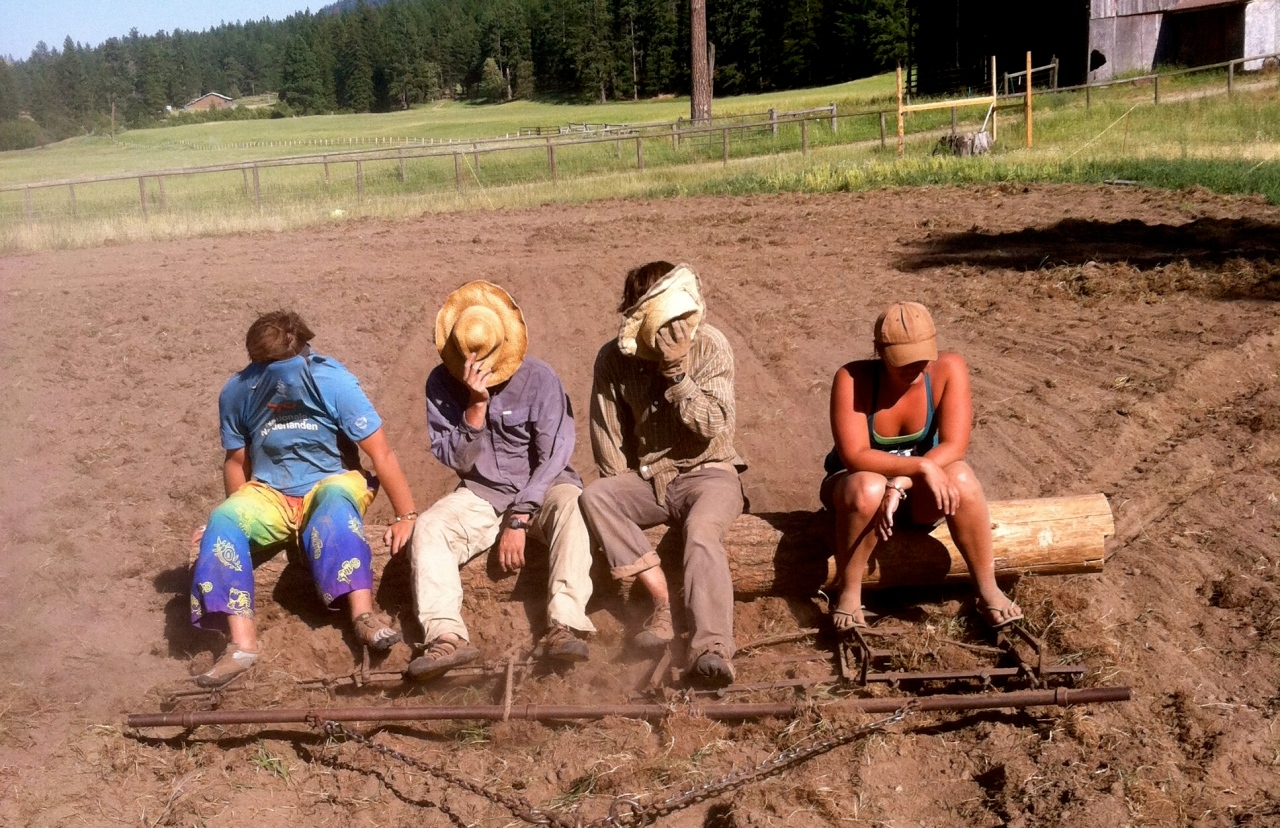
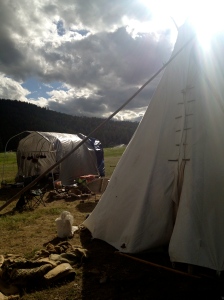
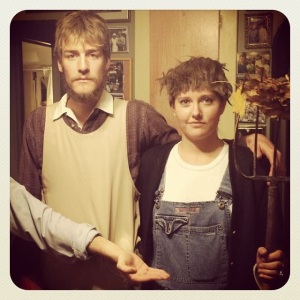
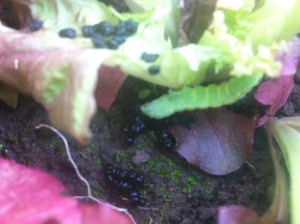


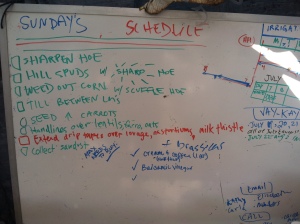
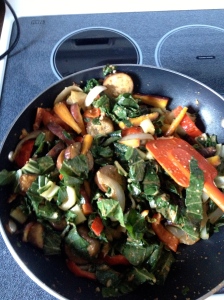
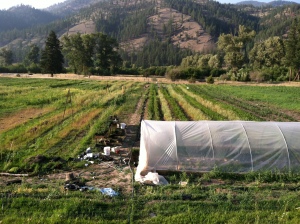
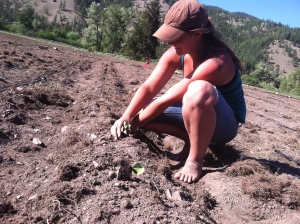
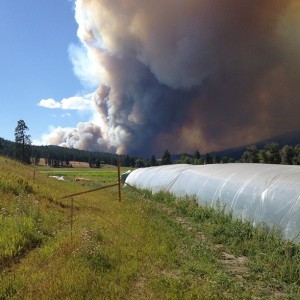
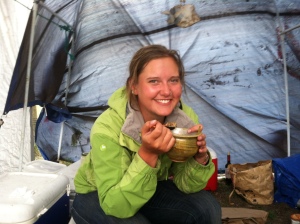
Beautifully written. Bravo.
Kiri, This was so fun and inspiring to read, thanks for sharing your summer’s adventures!